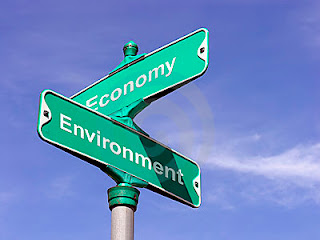The question is: "what is the difference between
'environmental communication' and 'sustainability communication'?" At the
root level, it is only the semantics that separate them, built by business
opportunists and capitalists -- or marketing specialists -- primarily the past
two decades to create enough specialization for enterprise. Sounds almost
counterintuitive to place capitalist enterprise and holistic ecological
concerns in the same breath, but there is simply no other reason for segmenting
an ideology into narrow slices -- though one might make an argument it is
exactly what religion did to the universality of Love and God. What are we left
with after all the slicing and dicing except a lapse in the very outcome we
seek? In environmentalism vs. sustainability, did we forget the overall goal?
Though it is no mistake that these new hybrid fields share
recognition of the fundamentally ethical nature of environmental problems and
social solutions, and the need to question the underlying premises of
traditional theories and methods, they have in great part overlooked the
significance of designed objects, structures and settlement patterns in the
creation of virtually all our environmental problems. Remaining is
process-focused in lieu of outcomes-oriented impediments to true sustainability
in our world. In short, the role of the built environment (cities, products,
landscapes, public spaces) has been overlooked due to marginalizations in favor
over preventative design.
The emergence of entire industries built around such
"fashions" is practically sickening. Equally so is investing time in
analyzing the semantics of words molded by marketing gurus to spin a trend for
gain. In lieu of rhetoric, was it even considered the role of nature in man's
existence over the course of human's historical existence? In fact, half the
world -- our brothers and sisters representing the Eastern model (Asia) could
impart evidence of a long-held inner belief that nature and man are
inseparable. Unfortunately, particularly in the Western hemisphere, nature has
increasingly been relegated to the province of environmentalists while cities
and towns have been turned over to developers and planners.
Missing is the notion that pursuing
"environmental" or "sustainable" is in fact separated from
any action or endeavor we embark. Truth is: we (humans) have separated them
over history through distancing ourselves in pursuit of conquest over nature.
Suggestion: read a book such as "Earth's Insights" by J. Baird Callicott and glean a multicultural survey of ecological ethics around the
globe. Embrace other perspectives. Consider the underlying deep cultural approach such as Vastu Vidya, or Taoist thinking to matters of design.
A faithful thinking might surmise that the cyclical nature
of the universe will allow the pendulum to swing back the other direction --
that a synergistic and holistic honoring of nature will respect her in every
action human hands touch. Certainly, the intensity of using buzzwords and
rallying "green" concepts has either prompted, or responded to, a
shift in the collective consciousness toward our view on nature. This can only
propagate future evolution in the positive direction, a premise hold dear by
this author.


No comments:
Post a Comment